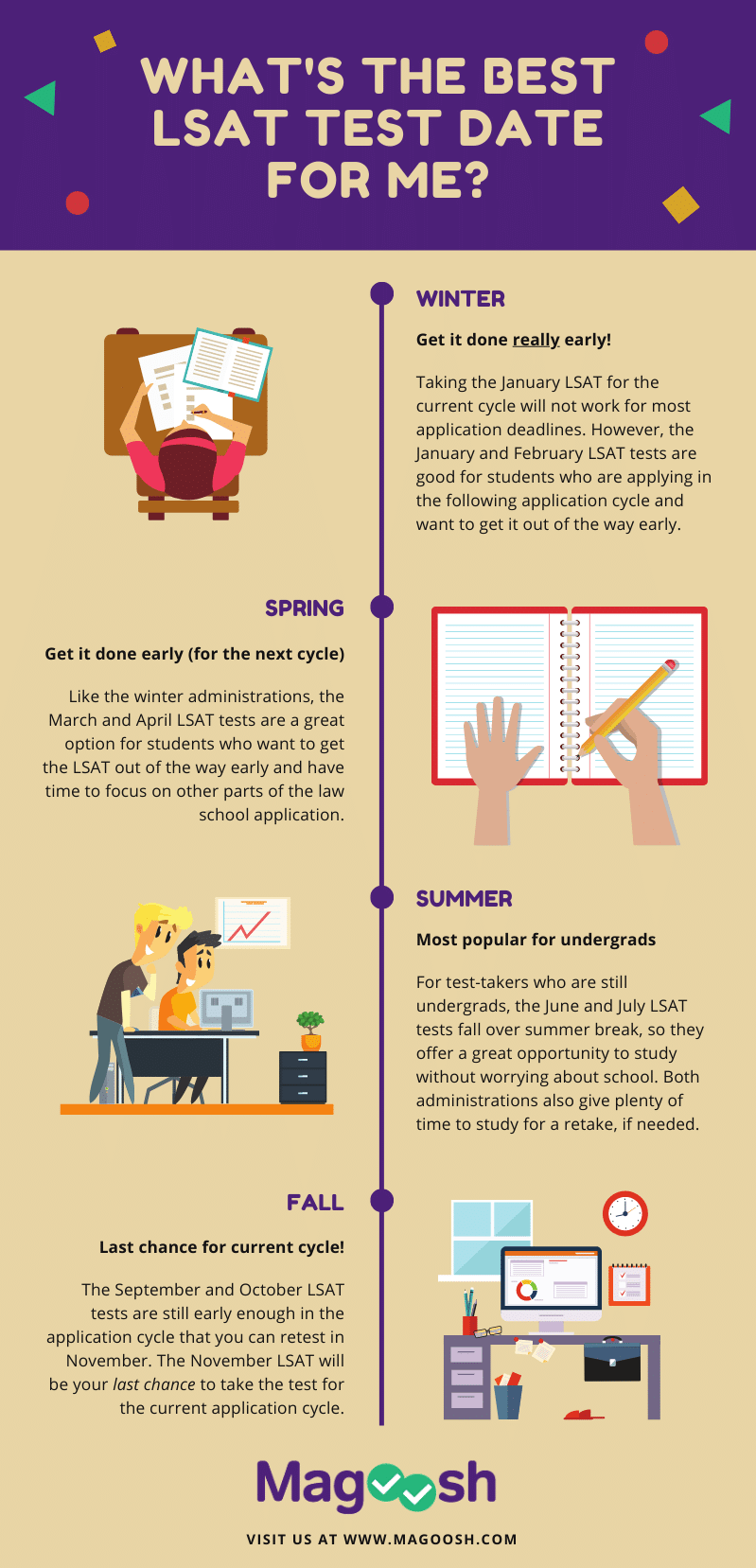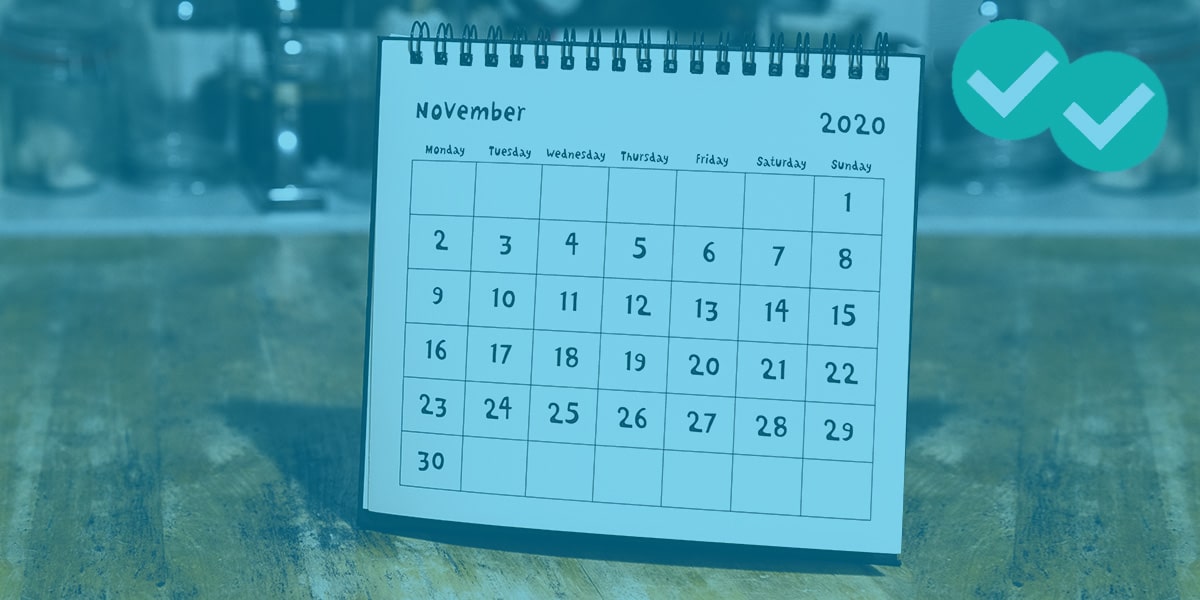
Update: Taking the LSAT in August 2024 or later? Be sure you know about major upcoming changes to the test and plan accordingly. In particular, the Analytical Reasoning section (aka Logic Games) will be removed, and there will be a new argumentative task in the Writing section. Now that you know about the changes, read on!
Thinking of applying to law school in 2024 or 2025? If so, it’s time to start planning out your LSAT test date and study schedule. To help you decide when to take the LSAT, we’ve outlined all of the upcoming LSAT dates announced by the Law School Admissions Council (LSAC) so far and some pointers to help you choose which administration is right for you.
Table of Contents
In this post, we’re going to go over:
- LSAT Test Dates, Registration Deadlines, and Score Release Dates (2024-2025)
- How do I register for the LSAT?
- What is the best LSAT test date for me? [Infographic]
- How long should I study before my LSAT date?
- Choosing an LSAT Study Schedule for Your Test Date
- Takeaway
LSAT Test Dates, Registration Deadlines, and Score Release Dates | 2024, 2025
The LSAT is normally offered nine times a year in the United States and Canada, which means you have plenty of dates to choose from, so pick the best date for you and your schedule.
The exam is typically administered on a Monday or Saturday but there are a few exceptions:
- All LSATs through at least June 2025 will be administered as remote LSATs, which are taken at home at a time selected by the test-taker. Future LSATs are also likely to be in the remote LSAT format until the COVID-19 situation is resolved.
- As of August 2022, the remote LSAT will include an unscored, experimental section. There will still only be three scored sections, though!
- Starting with the August 2024 exam, there will be two Logical Reasoning sections and one Reading Comprehension section. The Analytical Reasoning section (Logic Games) will no longer exist.
- Sabbath observers will be able to take an alternate weekday administration for any LSAT scheduled on Saturday.
- There is a Spanish LSAT offered once per year at two test centers in Puerto Rico. This exam is only intended for students applying to the three law schools located in Puerto Rico.
Be aware that taking the test on an alternative date may put your exam in the nondisclosed LSAT category, meaning that you will only receive your LSAT score, score band, and percentile rank. According to LSAC, this policy applies to both accommodated and non accommodated tests.
U.S. LSAT Test Dates and Times 2024-2025
| LSAT Date | LSAT Time | Registration Deadline | Score Release Date |
|---|---|---|---|
| September 2024 LSAT: 9/4/2024, 9/5/2024, 9/6/2024, 9/7/2024 | Selected by test-taker | 7/23/2024 | 9/25/2024 |
| October 2024 LSAT: 10/1/2024, 10/2/2024, 10/4/2024, 10/5/2024 | Selected by test-taker | 8/22/2024 | 10/23/2024 |
| November 2024 LSAT: 11/6/2024, 11/7/2024, 11/8/2024, 11/9/2024 | Selected by test-taker | 10/26/2024 | 11/27/2024 |
| January 2025 LSAT: 1/15/2025, 1/16/2025, 1/17/2025, 1/18/2025 | Selected by test-taker | 12/3/2024 | 2/5/2025 |
| February 2025 LSAT: 2/7/2025, 2/8/2025 | Selected by test-taker | 12/24/2024 | 2/26/2025 |
| February 2025: LSAT—Puerto Rico: 2/21/2025, 2/22/2025 | Selected by test-taker | 1/7/2025 | 3/12/2025 |
| April 2025 LSAT: 4/10/2025, 4/11/2025, 4/12/2025 | Selected by test-taker | 2/27/2025 | 4/30/2025 |
| June 2025 LSAT: 6/4/2025, 6/5/2025, 6/6/2025, 6/7/2025 | Selected by test-taker | 4/22/2025 | 6/25/2025 |
International LSAT Test Dates 2024-2025
| LSAT DATE | REGISTRATION DEADLINE | SCORE RELEASE DATE |
|---|---|---|
| October 2024 — LSAT 10/2/2024 | 8/22/2024 | 10/23/2024 |
| January 2025 — LSAT 1/17/2025 | 12/3/2024 | 2/5/2025 |
| April 2025 — LSAT 4/11/2025 | 2/27/2025 | 4/30/2025 |
| June 2025 — LSAT 6/6/2025 | 4/22/2025 | 6/25/2025 |
The LSAT is normally offered three times per year internationally. However, with the shift to the remote LSAT in the U.S. and Canada, the international LSAT has also gone remote and now includes an additional date.
Current LSAT test locations outside the United States and Canada include the following:
- Europe, Africa, and the Middle East
- Australia and New Zealand
- Asia and South Pacific Islands
- South America, Central America, Mexico, and Caribbean (excluding Puerto Rico & U.S. Virgin Islands)
If you are taking the LSAT outside of the US, check your ticket for the exact time of the exam.
How do I register for the LSAT?
You can register for the LSAT online through the LSAC website. You can also register by phone (215.968.1001).
Wondering when you can register for the LSAT? Generally, registration deadlines fall about 5-6 weeks before their respective LSAT test dates.
Test-takers outside the United States and Canada who live over 100 miles from a published LSAC testing center and are unable to travel to a published center may request a nonpublished test center. Nonpublished test center registration deadlines are typically one week earlier than the regular registration deadline.
If you’re registering on the day of the deadline, you should try to do so during normal EST business hours. If you experience technical glitches later at night and miss the deadline, LSAC will not allow you to register after the deadline.
Remember that spots fill up rather quickly at popular test centers, so it’s best not to wait until the last minute if you’d like to have a convenient commute. Make sure you consider all the factors to choose the best test center for you.
For those of you considering applying for special accommodations on the exam, you’ll want to start the online registration process as early as possible, since you can only submit your request for accommodations after you register for the exam.
For a full list of official upcoming LSAT dates and times, as well as registration deadlines, visit the LSAT website.
LSAT Change and Withdrawal Deadlines
If you change your mind about taking an upcoming LSAT and want to cancel your registration or choose another date, there are several options available. Keep in mind that there are LSAT fees associated with most of these changes.
First, all the way up until 11:59 PM EST the day before the test, you may withdraw your registration for the upcoming LSAT through your LSAC account. If you do this by the registration refund deadline (typically one month before the test date), you can request a full refund. After the full refund deadline has passed, you can request a partial refund ($50 refund) through your test’s partial refund deadline. Withdrawing your registration means the test will not appear on your record. Schools won’t know you signed up for that administration and it will not count toward your retake limit. Please note that withdrawing from the LSAT is different from canceling your score, which is something you may do after you take the test.
If you want to switch your test date rather than withdraw from a test administration altogether, you may elect to switch your test date up until the date change deadline (typically one month before the test date). Through your administration’s registration deadline, you will have the option to request a test date change free of charge. Switching your test date up to 10 days after your administration’s registration deadline adds $135 to your LSAT costs. After that, through the day before testing begins, you can request a test date change for $222.
- Important: If you plan not to take the test you’ve signed up for, remember to withdraw or change the test date before the day of the test.
If you fail to show up for a test that you’re registered for, you’ll receive an “absent” on your LSAT score record. Schools will be able to see this absence and it will count toward your LSAT retake limit.
LSAT Refund Policy
There is only one way to get a refund for an LSAT registration: you must withdraw online through your LSAC account by the registration refund deadline, which is typically one month before the test date. If you withdraw by this date, you must submit an LSAT Refund Request Form to LSAC in order to receive a $50 partial refund. There is no way to receive a full refund.
The fees associated with the LSAT can be a bit confusing, so make sure to review your options and try not to sign up for a test date that you know you won’t be ready for.
What is the best LSAT test date for me?
The good news is there are many LSAT dates to choose from—you just have to narrow down the best option for you. Consider when you’re planning to apply to law school, so you can ensure your LSAT scores will be available in time to apply.
If you’re not sure when you want to start law school, you have a little more flexibility. LSAT scores are valid for up to five years, so you can take the test early and leave a cushion for retakes, work obligations, and other outside commitments.
To help you select your date, let’s walk through the advantages and disadvantages of each test date.
Click to show the winter LSAT breakdown
January LSAT
The January LSAT is great for eager students applying in the following application cycle–it can take a lot of stress off your mind to know that you have many opportunities to retake and many more months to study and prepare your applications, if needed.
However, the January LSAT would be less than ideal for students interested in matriculating that same year, because some schools have application deadlines in early February, which is before January LSAT scores are released. So if you plan to rely on the January LSAT and intend to start law school in the fall of that year, make sure to check the application deadlines of the schools you’re interested in.
February LSAT
The February exam is another great option for students wanting to get the LSAT out of the way early. However, for the vast majority of schools, the February LSAT will be too late to apply for admission that same year. So think of the February LSAT as part of applications for admission the following year.
The advantage of the February exam is that it leaves you lots of time to retake the LSAT if you need and allows you to get the exam done early, leaving you time to focus on the other pieces of your application.
Click to show the spring LSAT breakdown
Spring LSAT Administrations
The LSAT is offered in March and April every spring in the United States and Canada. Like the February exam, these administrations are a great option for students who want to get the LSAT out of the way early and have time to focus on other parts of the law school application.
However, it’s not a good choice if you’re hoping to start law school the same year, because you’ll get the test results back too late to apply. So, only consider a Spring LSAT date if you’re hoping to get the LSAT done early in the application process and have time to retest, if needed.
Click to show the summer LSAT breakdown
Summer LSAT Administrations
The June and July administrations are the most popular test dates among students. For test-takers who are currently still in undergrad, they fall over summer break, so these administrations present a rare chance to study and take the test with fewer class and club responsibilities in the way. Keep in mind, however, that you’ll likely have final exams and course commitments to balance until just a few weeks before the test date.
Added bonus: The June and July exams are normally administered in the afternoon, so they’re the perfect choice for those of you who definitely aren’t morning people. That’s right—no need to fear oversleeping! (The March, October, and November exams are also offered in the afternoon for you night owls.)
Click to show the fall LSAT breakdown
September LSAT
One of the benefits of the September test date is that it gives you the entire summer to study—which is particularly advantageous for current undergrads. However, remember that those pesky fall semester classes will have started up again by September, so if you’re still in school, you’ll have more commitments on your plate. If you’re worried about getting rusty on the LSAT skills you picked up over the summer, try to keep up with your study schedule as much as you can even in the midst of homework and other tests.
The downside to taking your first LSAT around this time is that you’ll really want to nail this test if you plan to apply early in the admissions cycle. Getting a strong LSAT score from this test date is ideal because it will still allow you to apply about as early as all of the students who sat for the June LSAT. Also, if you need to retest, you can take the exam in October and still get your applications in on time.
October LSAT
Like the September exam, the October LSAT is early enough in the admissions cycle that you can retest if needed (in November). If you’re a student, however, you may wish to take the LSAT at a different time of year. October tends to be a very busy time with mid-terms and extracurriculars picking up speed. If you can, you may want to take the exam over the summer or in September to have more free time for studying.
November LSAT
The November LSAT will be the last chance you’ll have to take the LSAT and still be considered for the current admissions cycle by some law schools. Although many schools have application deadlines that will allow you to take the January LSAT, many do not.
You’ll be applying on the later end of the application cycle with a score from a November test, but you’ll still be on time if you make sure other parts of your application (like your resume and personal statement) are ready to go. Keep this point in mind especially if you’re flip-flopping about how ready you are for the September test.
Some students intentionally impose a September test date on themselves, even if that’s unrealistic for them to achieve a good score. Remember that every single law school will accept your November score. Be sure to give yourself enough time to do your best!

Recap: How to Choose the Right LSAT Exam Date
Pick a test date based on your schedule. If you know you have a crazy course load in the fall, but a light summer, plan accordingly. If you have plans for Cancun all summer and just can’t imagine bringing your LSAT books to crash that party, account for that. Everyone’s situation will look different.
The most important thing is to choose an exam date that you will be best prepared for. It’s stressful to be rounding the corner of your test date only to realize that you’re 10 points from where you want to be scoring. While there are pros and cons to each of the test dates on the calendar, they are all outweighed by a fantastic score—even if you have to apply later in the application cycle!
Ready to start prepping? Start by setting your LSAT prep goals here.
How long should I study before my LSAT date?
So now you might be wondering, “When should I start studying for the LSAT?” Ideally, give yourself at least three months to study for the LSAT.
Why at least three months? If you commit that amount of time and study for about three hours a day, five days a week, you’ll have logged enough time to truly familiarize yourself with the game types, reading passages, logical reasoning stems, and whatever else the LSAC might throw at you. However, think of three months as a minimum amount of time to study. Many students will benefit from studying longer and from planning for one or two retakes.
Remember, there is no way to “pass” or “fail” the LSAT. There is simply a way to master the test and get the score you need for the school of your dreams—or fall short and have to retake or reconsider your pool of potential schools. The LSAT stakes are high, so don’t sell yourself short on study time.
Now, on the other hand, you don’t want to go to the other extreme. Students who create year-long study plans often lose sight of the goal ahead and find it difficult to stay motivated. That said, you know your schedule best. Maybe you’ve got crazy work projects coming up or know that you’ve got killer classes on the horizon. In those cases, you may very well need more than three months to pull together a great LSAT score.
Choosing an LSAT Study Schedule for Your Test Date
Check out our LSAT study plans for guidance on how to prepare for your actual test date. Remember that these are only recommended schedules, not mandates you must follow word-for-word. Your personal study timeline should accommodate for class schedules, planned vacation trips, weddings…in other words, life! In addition, it’s a good idea to plan for one or two retakes, just in case you underperform on your first exam.
Takeaway
The right LSAT date depends on your own schedule and commitments, and when you plan to start law school. To do well on the LSAT, you have to set aside considerable time to study, so pick the test date that allows you sufficient time to study and retest, if needed. For example, if you want to apply early in the law school admissions cycle, consider targeting the June or July LSAT so that you have the option to retake in September or October, if necessary. Use our free study plans to help guide your preparation, and check out our highly effective and affordable LSAT course.
With the right preparation, we’re confident you’ll crush the LSAT.
This post was co-written by our LSAT experts Kevin, Travis, and Catherine.







Leave a Reply